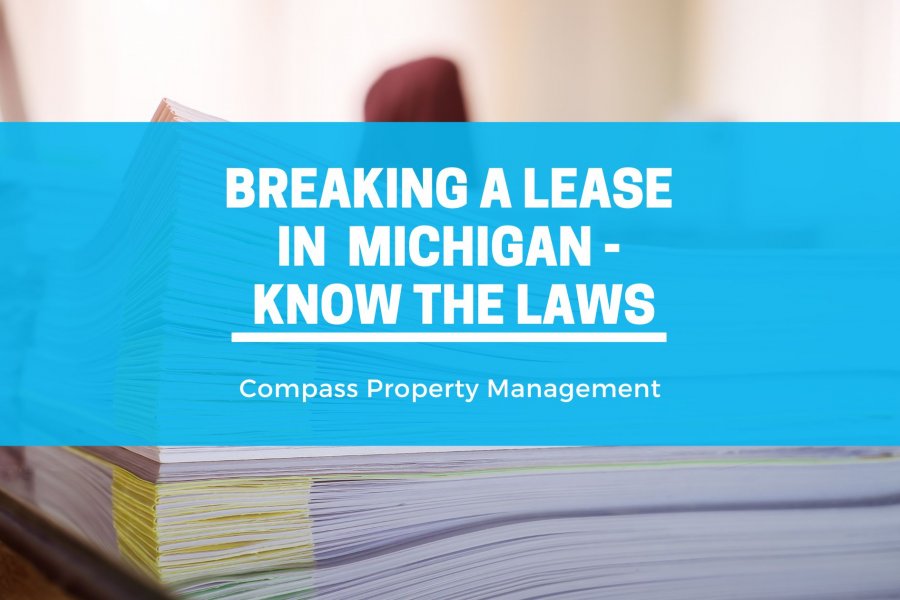
Renting out a property in Michigan isn’t all about collecting payments at the end of the month. There are a variety of rules and regulations that you need to understand if you want to be a successful landlord. And among a landlord's duty is understanding the rights and obligations of both parties when it comes to lease breaking and failure to pay rent under Michigan law.
In today’s article, we’ll look at both the justified and unjustified reasons for early lease termination. With this knowledge, you’ll be able to know what you can and can’t do when a resident wants to end their lease early.
Rental Agreement in Michigan
Under Michigan landlord-tenant law, a lease agreement for a rental unit can either be oral or written. However, it’s always a good idea to have a written lease so you can keep documentation of the agreement you and your residents have made. The expectation when both parties sign the lease is that the resident will remain in the rental property until the lease expires.
It goes without saying that you should ensure the lease agreement is clear and detailed to avoid potential conflicts or misunderstandings. You may choose to include an early termination clause. In regards to early lease termination, the following are some of the terms you’ll want to highlight.
- Penalties for breaking a lease. Let them know the financial repercussions that come with moving out early. If a landlord fails to do this and it's not a fixed-term lease, the resident may want to stay.
- The resident’s rights for justifiably breaking a lease. Let the resident know the instances where they can break a lease penalty-free.

- The lease termination notice requirements before a resident breaks their periodic lease. Specifically, let them know that they must provide you a seven-day notice when terminating a week-to-week lease, a 30-day notice when terminating a month-to-month lease, and a one-year notice for a yearly lease with no end date.
- State your responsibility to re-rent the unit after a resident terminates their lease. Michigan doesn’t require landlords to take reasonable efforts to re-rent their unit after a resident breaks their lease.
- State whether a resident can or can’t sublet the unit. In Michigan, a resident might be in the clear to sublet if the lease doesn’t prohibit it.
Unjustified Reasons to Break a Lease in Michigan
Not all reasons are created equally when it comes to the early breaking of a lease under Michigan law. Some may allow a resident to break their lease penalty-free while others may not. The following are unjustifiable reasons to break a lease.
- Moving in with a partner.
- After a divorce or separation.
- To upsize or downsize.
- To relocate for a new job or school.
- Moving into the new house the resident bought.
However legitimate these reasons may seem, they are generally not legal justification to release a resident from their lease obligations. The best solution would be to ask the landlord for a mutual termination.

Justified Reasons to Break a Lease in Michigan
Also, equally important is knowing the reasons that can allow your Michigan resident to break their lease early. The following are the justified reasons for breaking a lease.
1. Active Military Duty
Residents who enter active military duty and are relocated due to a deployment or permanent change of station are protected by federal law. The Servicemembers Civil Relief Act (SCRA) protects such residents from any liabilities pertaining to breaking a lease.
The resident, however, is still obligated by the act to provide certain details to the landlord prior to moving out. This will likely be providing a letter stating their deployment or permanent change of station, along with the notice to terminate their lease.
Although this is a justified reason, the lease doesn’t end immediately. The resident has to wait for the next rent cycle for the lease to end. This means that the resident will still be liable for paying the balance for the following month.
2. Unit Is Uninhabitable
One key responsibility that you have as a housing provider is keeping your Michigan rental property habitable. That’s why it’s important to respond to maintenance requests from residents promptly and inspect your property routinely.
Some of the conditions that you must provide under Michigan laws include the following:
- Ensuring proper waterproofing of the roof.
- Providing your residents with both hot and cold running water.
- Providing working smoke detectors and carbon monoxide detectors if required by the local municipality.
Also noteworthy is the landlord’s responsibility to make emergency repairs within a reasonable time frame.

3. Domestic Violence
Many states, including the state of Michigan, have laws that protect domestic violence victims. Under state law (MCL § 554.601b), domestic violence also includes sexual assault and stalking.
Before terminating the lease, though, the resident must provide some documentation proof, such as a personal protection order. Such as a protective order, probation, or any other release order that restricts the offender from coming into contact with them or their children.
4. Landlord Harassment
You know that treating your resident with respect is key to a successful business. You should always give your residents notice when you want to enter the rented premises (except in emergencies) and avoid “self-help” evictions.
You want to treat your residents with respect. Being accused of landlord harassment will not only hurt your reputation, but can also land you in legal trouble, not to mention losing any remaining rent.
5. Other Reasons
A resident in Michigan may also be able to break their lease early without penalty for the following reasons:
- If they have serious physical or mental health issues. The court can even refer them to a public health service, but they may be liable to pay all the rent before leaving.
- If the landlord seriously violates a term of the lease agreement, such as illegally raising the rent, or there's an early termination clause in the lease.
- Failure to provide the resident with mandatory disclosures prior to moving in.
- If the resident is no longer capable of living independantly or has become eligible for subsidized senior citizen housing and has lived in your property for over 13 months, they can provide 60-day written noice to terminate their lease early.
Bottom Line
There you have it. Everything you need to know when it comes to a resident breaking a lease in Michigan. If you have questions about other aspects of landlord-tenant law like a security deposit or are seeking expert help in managing your property, Compass Property Management can help.
We provide property owners in western Michigan with exceptional property management services. Whether you own one single-family home or a dozen properties, we can help. Get in touch to learn more about our unique array of property management services from multifamily homes to an apartment or rental unit.
Disclaimer: This blog isn’t intended to be a substitute for professional legal advice. Laws change and this information may become obsolete at the time you read it. For further help, please get in touch with a qualified attorney or an experienced property management company.
